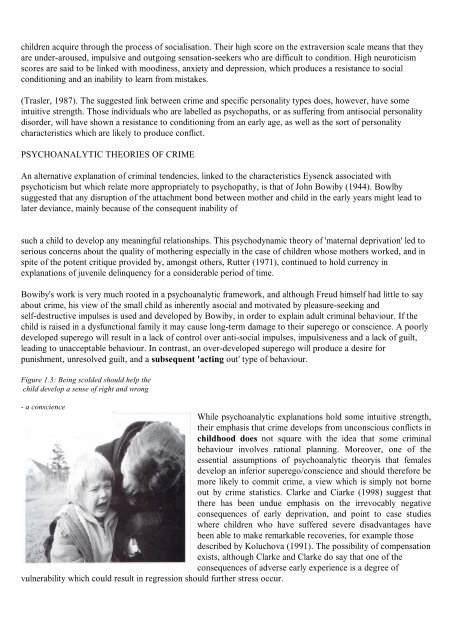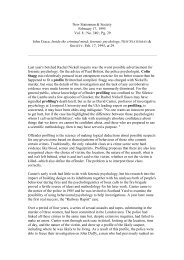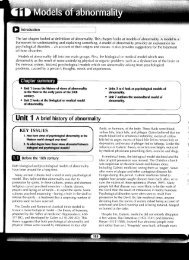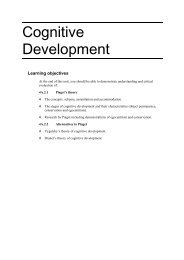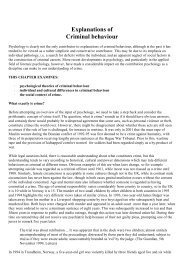Explanations of Criminal behaviour - Jeff Standen
Explanations of Criminal behaviour - Jeff Standen
Explanations of Criminal behaviour - Jeff Standen
Create successful ePaper yourself
Turn your PDF publications into a flip-book with our unique Google optimized e-Paper software.
children acquire through the process <strong>of</strong> socialisation. Their high score on the extraversion scale means that they<br />
are under-aroused, impulsive and outgoing sensation-seekers who are difficult to condition. High neuroticism<br />
scores are said to be linked with moodiness, anxiety and depression, which produces a resistance to social<br />
conditioning and an inability to learn from mistakes.<br />
(Trasler, 1987). The suggested link between crime and specific personality types does, however, have some<br />
intuitive strength. Those individuals who are labelled as psychopaths, or as suffering from antisocial personality<br />
disorder, will have shown a resistance to conditioning from an early age, as well as the sort <strong>of</strong> personality<br />
characteristics which are likely to produce conflict.<br />
PSYCHOANALYTIC THEORIES OF CRIME<br />
An alternative explanation <strong>of</strong> criminal tendencies, linked to the characteristics Eysenck associated with<br />
psychoticism but which relate more appropriately to psychopathy, is that <strong>of</strong> John Bowiby (1944). Bowlby<br />
suggested that any disruption <strong>of</strong> the attachment bond between mother and child in the early years might lead to<br />
later deviance, mainly because <strong>of</strong> the consequent inability <strong>of</strong><br />
such a child to develop any meaningful relationships. This psychodynamic theory <strong>of</strong> 'maternal deprivation' led to<br />
serious concerns about the quality <strong>of</strong> mothering especially in the case <strong>of</strong> children whose mothers worked, and in<br />
spite <strong>of</strong> the potent critique provided by, amongst others, Rutter (1971), continued to hold currency in<br />
explanations <strong>of</strong> juvenile delinquency for a considerable period <strong>of</strong> time.<br />
Bowiby's work is very much rooted in a psychoanalytic framework, and although Freud himself had little to say<br />
about crime, his view <strong>of</strong> the small child as inherently asocial and motivated by pleasure-seeking and<br />
self-destructive impulses is used and developed by Bowiby, in order to explain adult criminal <strong>behaviour</strong>. If the<br />
child is raised in a dysfunctional family it may cause long-term damage to their superego or conscience. A poorly<br />
developed superego will result in a lack <strong>of</strong> control over anti-social impulses, impulsiveness and a lack <strong>of</strong> guilt,<br />
leading to unacceptable <strong>behaviour</strong>. In contrast, an over-developed superego will produce a desire for<br />
punishment, unresolved guilt, and a subsequent 'acting out' type <strong>of</strong> <strong>behaviour</strong>.<br />
Figure 1.3: Being scolded should help the<br />
child develop a sense <strong>of</strong> right and wrong<br />
- a conscience<br />
While psychoanalytic explanations hold some intuitive strength,<br />
their emphasis that crime develops from unconscious conflicts in<br />
childhood does not square with the idea that some criminal<br />
<strong>behaviour</strong> involves rational planning. Moreover, one <strong>of</strong> the<br />
essential assumptions <strong>of</strong> psychoanalytic theoryis that females<br />
develop an inferior superego/conscience and should therefore be<br />
more likely to commit crime, a view which is simply not borne<br />
out by crime statistics. Clarke and Ciarke (1998) suggest that<br />
there has been undue emphasis on the irrevocably negative<br />
consequences <strong>of</strong> early deprivation, and point to case studies<br />
where children who have suffered severe disadvantages have<br />
been able to make remarkable recoveries, for example those<br />
described by Koluchova (1991). The possibility <strong>of</strong> compensation<br />
exists, although Clarke and Clarke do say that one <strong>of</strong> the<br />
consequences <strong>of</strong> adverse early experience is a degree <strong>of</strong><br />
vulnerability which could result in regression should further stress occur.


